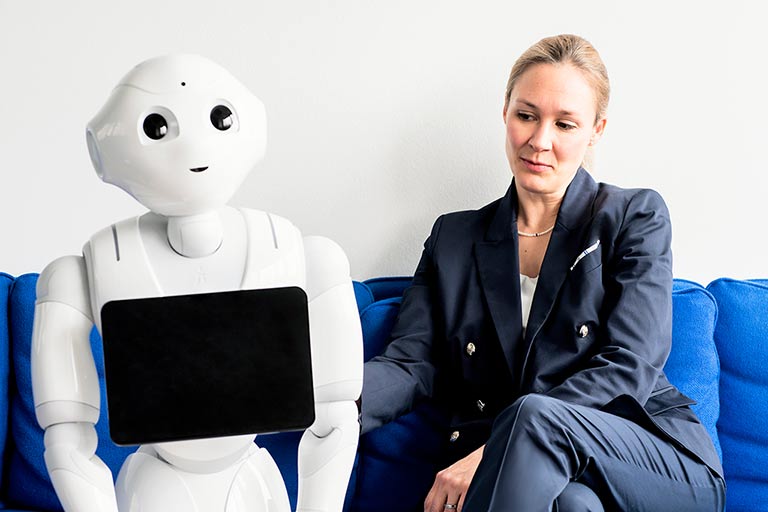Can robots be leaders? Our experts’ latest key findings in human-robot interaction research
Robots support us in manufacturing processes. Social robots are already able to interact with humans in complex social situations. Are robots also ready to be the next leaders in the workplace?
How do humans feel about a robot leader? Our research experts in the fields of human-robot interaction (HRI) and leadership have investigated this leadership scenario to explore new perspectives for the present and the future. Read more about their latest key findings on robot leadership in this article.
Imagine yourself in a room, alone or in a group. You look around and there is a robot – Pepper. This robot is a social semi-humanoid robot built for social interactions with humans. It introduces itself as your new leader at work and starts to give you a three-minute presentation about the company. How would you react?
Meeting a robot with two different leadership styles
We continue this thought experiment: You will encounter one of two different versions of Pepper in this scenario, depending on its leadership style. You will either hear a talk about vision-setting, confidence and enthusiasm concerning the company, underscored by grand gestures. In this case, you have met Pepper with the leadership style called “transformational”. Or you listen to the other version of Pepper that emphasizes specific incentives, objectives and requirements for completing tasks, with gestures that are more directive and subtle. This leadership style is called “transactional”. Which version of Pepper resonates more with you?
Conducting a study on robot leadership
The scenariodescribed above has already become reality. The 29 participants in the study on “Robot leadership–Investigating human perceptions and reactions towards social robots showing leadership behaviors.”, published in February 2023 by Dr. Jakub Edward Cichor, Prof. Dr. Sylvia Hubner-Benz, Dr.-Ing. Tobias Benz, Dr. Franziska Emmerling and Prof. Dr. Claudia Peus, experienced Pepper as a leader.
During the presentation, Pepper presented a leadership style and a task to university and Executive MBA students. The participants had to create a marketing strategy for a botanical company that Pepper had described to them earlier. They could stop at any moment. After having completed the work situation with the robot leader, the students talked about their experiences in individual interviews or within group discussions. You can find more information on the research method here.
Between dystopia and utopia – human reactions to Pepper as a robot leader
The participants perceived dealing with a robot leader in different ways. Their feelings fluctuated between hope and fear. Three key findings of the study are the following:
Technological understanding and general assumptions matter: The more technological knowledge about robots a person has and the more positive the attitude is towards robots in general, the better the person was able to see the potential for robots as leaders in the future.
The leadership style of the robot influences human perception: Participants felt more at ease with a robot using a transformational leadership style – which mirrors findings from research conducted with human leaders – and had less worries in regards to robots as leaders in general. They also felt optimistic that a robot with this leadership style could motivate them and be fairer than a human leader. In contrast, transactional leadership style evoked concerns and fears. Participants were more worried about the fact that the robot could not display empathy, intuition or motivation for them. There was also skepticism about the way the robot was programmed, and participants signalled a desire to get to know the programmer in order to trust the robot.
The lack of emotions of a robot triggers hopes and fears: Regardless of the leadership style, the participants perceived Pepper’s lack of emotions differently. On the one hand, they saw the potential for fair decisions and efficiency in daily business, as robots do usually not base their actions on emotions like humans. On the other hand, they were concerned about the lack of emotions because they look for empathy and emotional connection with a leader.
As the study suggests, people’s reactions to robots as leaders vary.
Nevertheless, the study’s participants frequently imagined one of two future scenarios: One set of participants mentioned utopian beliefs, imagining a form of robot leadership that serves humans. The others perceived robots as leaders in a dystopian way, as “arbiters of doom”. Crucially, after the participants reflected on their experience with Pepper and their subsequent views, they started to develop more realistic and balanced future vision of robot leaders. Of course, this study has certain limitations: it was conducted with a limited number of participants and it would moreover be interesting to further explore their reactions, e.g. when they are confronted with other leadership styles and in different cultural settings. The authors of the study conclude that there should be more research on robot leadership in the field of human-robot interaction (HRI) in the coming years.
How robots will evolve as leaders lies in the future. However, the study shows that more knowledge about the technology and a certain type of leadership style encourage a positive outlook on future scenarios. The interaction with robots as leaders relies more on human aspects than one might expect.
Do you want to learn more about this study? You have free access to the research paper here:
Cichor JE, Hubner-Benz S, Benz T, Emmerling F, Peus C (2023): Robot leadership–Investigating human perceptions and reactions towards social robots showing leadership behaviors. PLoS ONE 18(2): e0281786. https://journals.plos.org/plosone/article?id=10.1371/journal.pone.0281786
LifeLong Learning: Take a deep dive into technology with our certificate programs.

